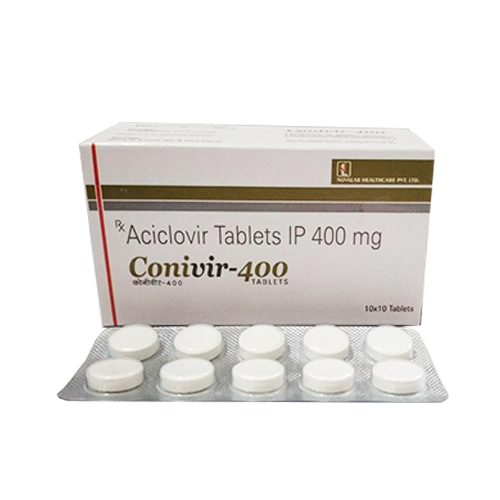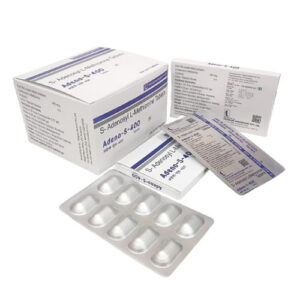- Home
- TABLETS / CAPSULES / SOFT GEL
- Aciclovir Tablets

Aciclovir Tablets
CONIVIR-400
Enquiry about Aciclovir Tablets

Conivir-400 is the fusion of Aciclovir Tablets which is an antiviral medication used to treat viral infections caused by the herpes simplex virus, including cold sores, genital herpes, and shingles. The medication works by inhibiting the virus’s ability to replicate and spread, reducing the severity and duration of symptoms. Aciclovir tablets are usually taken orally, with or without food, and the dosage will depend on the type and severity of the infection being treated. Common side effects include nausea, headache, and diarrhea, but these are usually mild and go away on their own.
In addition to treating herpes infections, aciclovir tablets may also be used to prevent outbreaks in people who have frequent episodes of herpes. It is important to start treatment as soon as possible after symptoms appear to maximize its effectiveness. Aciclovir tablets are not a cure for herpes, and the virus can still be transmitted to others, even when symptoms are not present. It is important to practice safe sex and avoid close contact with others during an outbreak to prevent the spread of the virus.
Uses of Aciclovir Tablets
Aciclovir Tablets inhibit the ability of the herpes virus to replicate and spread by blocking the action of a viral enzyme called DNA polymerase. This reduces the severity and duration of symptoms. Aciclovir is most effective when taken as soon as possible after symptoms appear.
- Treats viral infections caused by the herpes simplex virus, including cold sores, genital herpes, and shingles.
- Inhibits the virus’s ability to replicate and spread, reducing the severity and duration of symptoms.
- Usually taken orally, with or without food.
- Dosage will depend on the type and severity of the infection being treated.
- Can also be used to prevent outbreaks in people who have frequent episodes of herpes.
- It is important to start treatment as soon as possible after symptoms appear to maximize its effectiveness.
- Common side effects include nausea, headache, and diarrhea.
- Not a cure for herpes and the virus can still be transmitted to others, even when symptoms are not present.
- It is important to practice safe sex and avoid close contact with others during an outbreak to prevent the spread of the virus.
Possible Side Effects
Aciclovir Tablets can cause some side effects to some individuals in some cases. Have a look at some of the side effects that one might face.
- Headaches
- Feeling dizzy
- Feeling or being sick
- Diarrhoea
Directions For Use
- Aciclovir tablets are usually taken orally, with or without food.
- The dosage will depend on the type and severity of the infection being treated.
- It is important to follow the instructions provided by your doctor or pharmacist regarding the dosage and duration of treatment.
- Aciclovir tablets are most effective when taken as soon as possible after symptoms appear.
- It is important to complete the full course of treatment, even if symptoms improve before the medication is finished.
- If you miss a dose, take it as soon as possible, but do not take a double dose to make up for a missed one.
- Common side effects of aciclovir tablets include nausea, headache, and diarrhea. If you experience any severe or persistent side effects, contact your doctor or pharmacist.
- Aciclovir tablets may not be suitable for everyone, so it is important to discuss any existing medical conditions or medications with your doctor or pharmacist before taking this medication.
Safety Precautions
- These may interact with other medications, including over-the-counter drugs and herbal supplements. It is important to inform your doctor or pharmacist of all medications you are currently taking before starting treatment with Aciclovir.
- They may not be suitable for people with certain medical conditions, such as kidney problems or a weakened immune system. It is important to discuss any existing medical conditions with your doctor before taking this medication.
- it should not be used during pregnancy or breastfeeding unless advised by a doctor. If you are pregnant or breastfeeding, talk to your doctor before taking this medication.
- They can cause dizziness or drowsiness, so it is important to avoid driving or operating heavy machinery until you know how this medication affects you.
- It may increase the risk of kidney problems in some people, so it is important to stay well hydrated while taking this medication and to monitor your kidney function regularly with blood tests. If you experience any symptoms of kidney problems, such as decreased urination or swelling in the feet or ankles, contact your doctor immediately.





